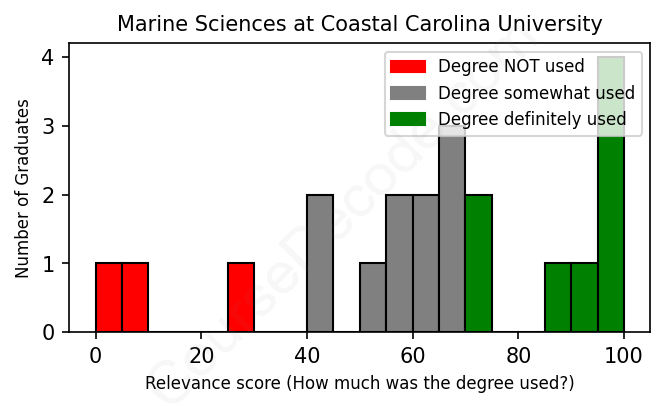
First, some facts. Of the Marine Sciences graduates from Coastal Carolina University we've analyzed , here's how many have used (or NOT used) their degree in their career:

These are estimates based on AI analysis of 21 LinkedIn profiles (see below).
The verdict? Slightly below average. Overall, with an average relevance score of 62%, Marine Sciences graduates from Coastal Carolina University have a slightly lower likelihood (-5%) of finding work in this field compared to the average graduate across all fields:
And for comparison, here's the chart for all profiles we've looked at across all degrees.
Also, after graduating, only 33% of these graduates have pursued further education other than another Bachelor's degree (such as a Masters degree or other), compared to the average across all profiles of 35%. This suggests a Bachelors degree is enough for most Marine Sciences graduates, and it's normal to look for work straight after graduation.
See the details:
|
Relevance score: 66% We think this person has gone into a career only somewhat relevant to their degree. We think this person has gone into a career only somewhat relevant to their degree.
DEGREE INFOGraduated in 2015 from Coastal Carolina University with a Bachelor of Science - BS in Marine Sciences. Also pursued further education since (see below). JOB HISTORY SINCE GRADUATIONMarine Conservation Intern Reef Environmental Education Foundation Aug 2015 - Dec 2015 Specimen Processer  Quest Diagnostics Nov 2016 - Oct 2017 Scuba Diving Instructor & Store Manager  Inland Dive Center Feb 2018 - Aug 2018 Summer Research Intern  Mote Marine Laboratory & Aquarium May 2019 - Aug 2019 Laboratory Assistant  George Mason University 2018 - Jan 2022 National Coral Reef Management Fellow - Florida  Nova Southeastern University Jan 2022 - Jan 2024 National Coral Reef Institute Program Manager  Nova Southeastern University Jan 2024 - Present FURTHER DEGREES DONE SINCE GRADUATINGEnvironmental Science and Policy, MSGeorge Mason University 2018 - 2021 ABOUTI am a marine scientist currently completing a master's degree in Environmental Science & Policy at George Mason University. My current research interests include better understanding the roles symbionts play within the coral holobiont in regards to disease susceptibility. Particularly, the importance of Symbiodiniaceae genera within Caribbean stony corals. Currently, I am working within the histology lab at George Mason University with a focus on preparing and analyzing histological slides. |
The top 10 most common jobs done by the graduates we've analyzed (ranked most common to least) are:
From analyzing the career paths of graduates with a degree in Marine Sciences from Coastal Carolina University, it seems that many have pursued jobs that match their educational background, especially in fields related to marine biology, ecology, and environmental science. A lot of them have taken on roles as biologists, marine educators, or engaged in hands-on marine research, like internships with NOAA or positions as Marine Mammal Trainers. These jobs widely utilize the specific skills and knowledge they gained during their studies, indicating a strong relevance to their degree. For instance, several graduates have ended up working with state and federal agencies focusing on wildlife and environmental conservation, which are direct extensions of their marine science training.
However, it's also evident that not every job aligns directly with marine sciences. Some graduates have ventured into roles like nannying, restaurant management, and administrative positions, which do not leverage their specialized education. While it's not uncommon for graduates to explore various career options, the data suggests a mixed bag of relevance when it comes to applying their marine sciences knowledge in the workplace. Overall, those who remain within marine-focused sectors tend to feel a stronger connection to their degree, while others in unrelated fields might not fully engage with what they learned at Coastal Carolina University.
Here is a visual representation of the most common words in job titles for Marine Sciences graduates (this is across all Marine Sciences graduates we've analyzed, not just those who went to Coastal Carolina University):

Looking at the career trajectories of graduates from Coastal Carolina University with degrees in Marine Sciences, it seems there's a mix of outcomes. When they first graduate, many go into roles that closely relate to their studies, such as internships, marine education, or research positions, particularly with organizations like NOAA and various marine laboratories. For example, some have started as marine educators or technicians, which aligns nicely with their academic background. However, there’s a noticeable scatter, with some graduates pivoting to unrelated fields. Over time, about five to ten years post-graduation, many graduates have found more solid footing in careers related to marine biology, wildlife management, or teaching, but there are also those who have transitioned into corporate roles or entirely different industries.
Some success stories include graduates transitioning into positions like Biological Scientists and Project Managers in marine conservation, which suggests a solid path if they stayed in the field. On the flip side, a fair number have drifted into roles that don’t tap into their marine sciences training—like real estate or restaurant management. This indicates that while there are promising career paths for marine science graduates, the job market can pull them into unrelated sectors, especially if they’re not eager to stick with research or fieldwork. Overall, the picture is a bit mixed; graduates definitely have opportunities related to their degree but can easily find themselves in roles that stray far from their initial passion for the ocean and marine ecosystems.
Alright, so diving into a Bachelor’s degree in Marine Sciences at Coastal Carolina University can be a bit of a mixed bag, honestly. It’s not necessarily the easiest degree out there, but it’s also not the most impossible one either. You’ll be looking at a fair amount of science coursework—think biology, chemistry, and oceanography—so if science isn’t your jam, it might be a bit challenging. There’s also fieldwork involved, which can be super exciting but requires commitment. Many students find it manageable if they stay organized and passionate about marine life, but it definitely takes some effort and dedication. So, if you’re into the ocean and committed to learning, you’ll find it a rewarding journey, just with a good amount of studying and hard work along the way!
Most commonly, in the LinkedIn profiles we've looked at, it takes people 4 years to finish a Bachelor degree in Marine Sciences.
Looking at the job paths of these Marine Sciences grads from Coastal Carolina University, it seems like their earning potential varies quite a bit. Some grads have landed solid jobs, like biologists and educators at reputable organizations, which likely means they're making decent salaries over time. For instance, positions in marine research or as a Senior Research Associate usually come with good pay. However, others took on roles like nannying or working in restaurants, which probably aren't bringing in the big bucks. Overall, it looks like while some are doing pretty well, others may still be on the lower end of the salary spectrum, especially early on in their careers. So, it’s a mixed bag – some are probably living comfortably, while others may still be working their way up.
Here is a visual representation of the most common words seen in the "about" section of LinkedIn profiles who have a Bachelor degree in Marine Sciences (this is across all Marine Sciences graduates we've analyzed, not just those who went to Coastal Carolina University). This may or may not be useful:

Here are all colleges offering a Bachelor degree in Marine Sciences (ordered by the average relevance score of their Marine Sciences graduates, best to worst) where we have analyzed at least 10 of their graduates:
| College | Score | Count |
|---|---|---|
 Coastal Carolina University Coastal Carolina University
|
62 | 21 |